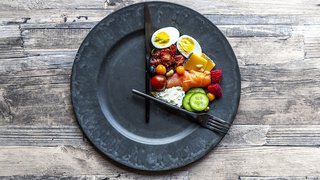Coumadin users: Let us go easy on the lettuce
July 10, 2014

Summertime is traditionally one of the best times to enjoy salads. Seasonal fruits and vegetables are readily available and at peak flavor, and keeping your kitchen cool is easier when there's no need to turn on the oven. Additionally, salads make a great side dish served with grilled foods, or they can be the perfect main entrée topped with chilled chicken, fish, or vegetables.
However, for some individuals on the medication Coumadin, eating salads can be worrisome because many lettuces and trendy greens are rich in vitamin K, which can interfere with this medication. Coumadin is prescribed to reduce the risk of forming blood clots. Blood clots form through a series of chemical reactions that depend on vitamin K; therefore, eating too many foods rich in vitamin K may reduce how well Coumadin works. To test if your blood is clotting well – i.e., "not too quickly and not too slowly" – your physician measures your International Normalized Ratio (INR), which has a desired range of 2.0 to 3.5.
INR on the Radar
Follow these tips to keep your INR within range:
Avoid the following dietary supplements and herbal medications:
- Take your Coumadin as prescribed
- Maintain a consistent intake of vitamin K obtained from food by
- Eating no more than one serving of food with high vitamin K content per day (see Table 1)
- Eating no more than three servings of food with moderate vitamin K per day (see Table 2)
- Avoid alcohol – consult with your physician
- Take no more than 1000 IU of vitamin E daily
- arnica
- insositol hexaphosphate
- bilberry
- licorice
- butcher's broom
- melilot (sweet clover)
- cat's claw
- pau d'arco
- dong quai
- red clover
- feverfew
- St. John's wort
- forskolin
- sweet woodruff
- garlic
- turmeric
- ginger
- willow bark
- ginkgo
- wheatgrass
- horse chestnut
Letting Up on the Lettuce
Follow these tips to enjoy summer salads even if you take Coumadin:
- When preparing a lettuce-based salad, choose lighter-in-color lettuces, which are lower in vitamin K than darker lettuces and trendy greens
- Keep your serving size small, generally to a ½ cup if raw and chopped or 1 to 1 ½ cups if raw and leafy
- Choose to eat either green, leafy salad or coleslaw at a given meal – not both
- Make non-lettuce/non-greens-based salads, for example, carrot or fruit salad (see recipes below)
Foods with high vitamin K content
Kale, ½ c. cooked, 531 mcg
Collards, ½ c. cooked, 530 mcg
Kale, 1 c. raw, 472 mcg
Spinach, ½ c. cooked, 444 mcg
Turnip greens, ½ c. cooked, 425 mcg
Mustard greens, ½ c. cooked, 415 mcg
Beet greens, ½ c. cooked, 349 mcg
Swiss chard, ½ c. cooked, 286 mcg
Parsley, ¼ c. raw, 246 mcg
Foods with moderate vitamin K content
Brussels sprouts, ½ c. cooked, 150 mcg
Spinach, 1 c. raw, 145 mcg
Broccoli, ½ c. cooked, 132 mcg
Broccoli rabe, ½ c. cooked, 109 mcg
Cabbage, ½ c. cooked, 82 mcg
Asparagus, ½ c. cooked, 72 mcg
Cabbage, 1 c. raw, 68 mcg
Lettuce (butterhead, Boston, or bibb), 1 c. raw, 56 mcg
Fruit Salad Recipe
Red Cabbage Slaw Recipe
Carrot Salad Recipe
Pistachio Salad Recipe














